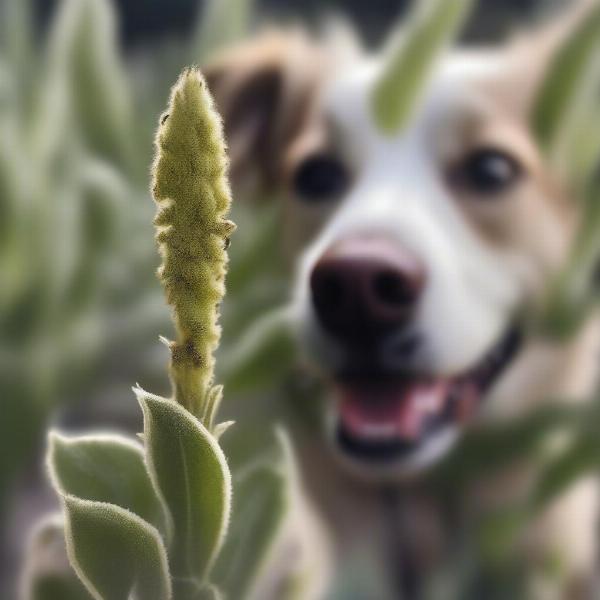Mullein, a common wildflower, is known for its purported health benefits for humans. But what about our canine companions? Is mullein safe for dogs? This is a question many dog owners ask, and it’s crucial to understand the potential risks and benefits before exposing your furry friend to this plant. This article will explore the safety of mullein for dogs, providing evidence-based information and practical advice for pet owners.
Mullein is generally considered safe for dogs in small amounts. However, it’s essential to understand that while the plant itself might not be inherently toxic, there are potential risks associated with its use. The fine hairs on the leaves can cause skin irritation or become lodged in the eyes, nose, or throat, leading to discomfort or breathing difficulties. Additionally, some dogs might be more sensitive to mullein than others, so it’s always best to err on the side of caution.
Understanding the Potential Benefits and Risks of Mullein for Dogs
While scientific research on the effects of mullein on dogs is limited, traditionally, mullein has been used in herbal remedies for respiratory issues. Some proponents believe that mullein can soothe coughs and reduce inflammation in the respiratory tract. However, these claims haven’t been scientifically proven in dogs. Therefore, it’s essential to consult with a veterinarian before using mullein to treat any health conditions in your dog.
 Mullein Plant and Dog Safety
Mullein Plant and Dog Safety
One of the primary risks associated with mullein is the potential for skin and mucous membrane irritation. The tiny hairs on the mullein leaves can cause itching, redness, and inflammation if they come into contact with your dog’s skin. If ingested, these hairs can also irritate the mouth, throat, and digestive tract.
Safe Practices When Considering Mullein for Your Dog
If you’re considering using mullein for your dog, always consult with your veterinarian first. They can advise you on the potential risks and benefits based on your dog’s individual health status. Never use mullein as a replacement for conventional veterinary care, especially if your dog is showing signs of illness.
When using mullein, ensure it’s from a reputable source and free from pesticides or other harmful chemicals. Avoid allowing your dog to directly access mullein plants growing in the wild, as you can’t be sure of their purity or safety.
Recognizing Signs of Mullein-Related Issues in Dogs
If your dog has come into contact with or ingested mullein, watch for signs of irritation, such as excessive scratching, pawing at the face, coughing, sneezing, or difficulty breathing. If you notice any of these symptoms, contact your veterinarian immediately.
“Always prioritize your dog’s safety when considering any herbal remedy,” advises Dr. Emily Carter, DVM. “While some plants might have potential benefits, it’s crucial to consult with a veterinarian before using them on your pets.”
Can Dogs Eat Mullein?
While small amounts of mullein are unlikely to cause serious harm, it’s best to avoid letting your dog consume large quantities of the plant. The hairs on the leaves can cause digestive upset and irritation. Dr. Sarah Miller, a veterinary herbalist, adds, “Mullein can be beneficial in certain situations, but it’s essential to use it cautiously and under the guidance of a qualified professional.”
Conclusion
While mullein is generally considered safe for dogs in small amounts, potential risks exist, such as skin and mucous membrane irritation. Always consult your veterinarian before using mullein for your dog, and prioritize conventional veterinary care for any health concerns. By being informed and cautious, you can help ensure your dog’s safety and well-being.
FAQ
- What should I do if my dog eats mullein? Contact your veterinarian immediately, especially if your dog shows signs of discomfort or distress.
- Can I use mullein oil on my dog? Consult with your veterinarian before applying any mullein products to your dog’s skin.
- Are there any alternative remedies for respiratory issues in dogs? Yes, several conventional and alternative treatments are available for respiratory issues in dogs. Consult your veterinarian for the best course of action.
- Is mullein toxic to puppies? Puppies are generally more sensitive than adult dogs, so it’s best to avoid exposing them to mullein.
- Can I grow mullein in my garden if I have a dog? If you choose to grow mullein, ensure your dog cannot access it.
- What are the signs of mullein poisoning in dogs? Signs of irritation, such as excessive scratching, pawing at the face, coughing, sneezing, or difficulty breathing may indicate a reaction to mullein.
- Are there any dog breeds more susceptible to mullein-related issues? Dogs with sensitive skin or allergies might be more prone to reactions to mullein.
ILM Dog is your trusted source for comprehensive and reliable information on dog care and well-being. We offer expert advice on a variety of topics, from breed selection to health care, training, nutrition, grooming, and more. For personalized guidance and support, contact our team of experts at [email protected] or call us at +44 20-3965-8624. ILM Dog is committed to helping you provide the best possible care for your canine companion.